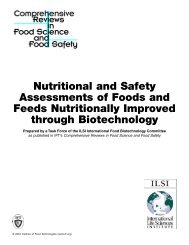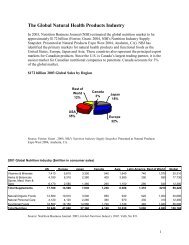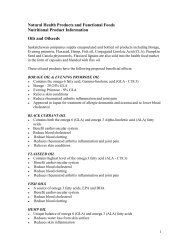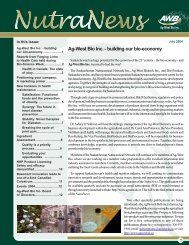Beyond Borders: Global biotechnology report 2010
Beyond Borders: Global biotechnology report 2010
Beyond Borders: Global biotechnology report 2010
Create successful ePaper yourself
Turn your PDF publications into a flip-book with our unique Google optimized e-Paper software.
The year saw some examples of global<br />
<strong>biotechnology</strong> companies collaborating<br />
with state-run institutes on research<br />
initiatives. In March 2009, US-based<br />
FORMA Therapeutics collaborated with<br />
Singapore‘s Experimental Therapeutics<br />
Center to discover novel compounds based<br />
on FORMA’s transformative chemistry<br />
platform. FORMA has also established<br />
its first overseas laboratory in Nanyang<br />
Technological University. Meanwhile,<br />
Singapore Immunology Network, a research<br />
consortium under Singapore’s Agency of<br />
Science, Technology and Research, has<br />
partnered with two European biotech<br />
companies — Humalys SAS and Cytos<br />
Biotechnology — to develop antibodies<br />
targeting viruses prevalent in Asia,<br />
including hand, foot and mouth disease.<br />
The global recession<br />
The global economic slowdown has<br />
exacerbated the challenge of raising<br />
funds for the <strong>biotechnology</strong> industry in<br />
Singapore, where local financing options<br />
are limited and the industry has to largely<br />
depend on investments from global players.<br />
With venture capital and equity market<br />
investments drying up for most biotech<br />
companies, the Government of Singapore<br />
made concerted efforts to help the industry<br />
stay afloat. The Government introduced a<br />
“jobs credit scheme” in its 2009 budget to<br />
provide companies with cash grants to help<br />
retain employees during the downturn.<br />
As in other parts of the world, the<br />
challenging capital situation has heightened<br />
the focus on extracting more value from<br />
existing assets and capabilities as well<br />
as on acquiring assets of ailing biotech<br />
companies. In October 2009, Singaporebased<br />
vaccine research player SingVax and<br />
US-based Inviragen merged to integrate<br />
their vaccine pipelines that are focused on<br />
infectious diseases prevailing in developing<br />
44 <strong>Beyond</strong> borders <strong>Global</strong> <strong>biotechnology</strong> <strong>report</strong> <strong>2010</strong><br />
nations. The merged company also raised<br />
a US$15 million equity investment from<br />
a syndicate of private equity and venture<br />
investors. In July 2009, Transcu Group<br />
acquired a 45% equity interest in the<br />
Japanese Biomass Technology Company<br />
for a total consideration of ¥27 million<br />
(US$277,560). Biomass Technology<br />
Company has developed capabilities to<br />
produce biofuels from inedible biomass<br />
without fermentation.<br />
Outlook<br />
Cost advantages, best-in-class infrastructure<br />
and strong Government investments<br />
have made Singapore an attractive<br />
manufacturing location for multinational<br />
drug companies. However, cross-country<br />
cost advantages tend to be short-lived.<br />
Singapore has been sweetening the pot with<br />
large tax incentives, which may also prove<br />
unsustainable in the longer term. To take<br />
its success to the next level, the city-state<br />
will need to bring its focus and resources to<br />
fostering homegrown innovation.








